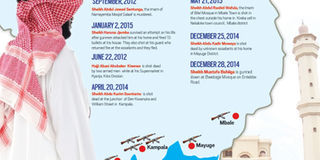Another Muslim cleric shot dead

What you need to know:
Attack. Sheikh Abdul Rashid Wafula, the Imam of Bilal Mosque in Mbale Town, was shot in the chest on Thursday shortly after 8.30pm
KAMPALA/MBALE.
Another Muslim leader was on Thursday night gunned down by unknown assailants outside his home in Kireka cell in Nakaloke Town Council, Mbale District.
According to family sources, Sheikh Abdul Rashid Wafula, the Imam of Bilal Mosque in Mbale Town, was shot in the chest shortly after 8.30pm.
Attempts by family members to rush the 47-year-old cleric to hospital yielded no positive results as he died on the way.
Police spokesman Fred Enanga said four people, including the deceased’s brother have been arrested over the murder.
Area police spokesperson Diana Nandawula corroborated Enanga’s statements that police had arrested some suspects and commenced investigations into the case.
“We have already arrested four people in connection with the murder and these are going to help police in investigations. We are also following the clues. We shall get more culprits. Our job is law enforcement and I promise, we shall get the culprits,” Ms Nandawula said.
She said the killers are an organised group because they fired only two bullets before jumping onto the motorcycle and headed to Mbale Town.
“When they reached Nkoma, some boda boda (commercial motorcyclists) saw them with a gun and started shouting and this prompted them to shoot in the air and turned back to Nakaloke.
Although the killing was done using a boda boda and a gun similar to others committed in the past, we should not rush to conclude that someone is targeting Muslims in the country,” Ms Nandawula cautioned.
The Uganda Muslim Supreme Council (UMSC) in a statement yesterday, described Sheikh Wafula as “a very active and dedicated member of UMSC who has served Islam in different ways under different capacities”.
“His work in supporting orphans and Muslims in need speaks volumes. We have lost one of the most dedicated Sheikhs who had Islam and his country at heart. May Allah reward him with Janna Firdaus (heaven),” the UMSC said in the statement signed by the public relations officer, Mr Nsereko Mutumba.
Prayers held
Muslim leaders eulogised Sheikh Wafula during the dhuwa (prayers for the repose of his soul) and decried the increasing spate of targeted killings and lack of conclusive investigations by police.
Various speakers and family members also accused several colleagues of having a hand in the killing of Sheikh Wafula.
“Several neighbours who heard the gunshots said they saw the assailants disappear on a motorcycle,” Mr Jaffer Maniaku, a close neigbour said.
Mr Ibrahim Saadi, a closer neighbour and relative, said shortly after hearing gunfire, he heard the sound of a motorcycle being ridden away.
“When we reached the scene, we found him half dead because they had shot him through the neck and chest. We tried to take him to Mbale regional hospital and he died on the way,” Mr Saadi said.
The Mufti of Uganda, Sheikh Shaban Mubajje, broke down midway his speech at the Dhuwa prayers at Nakaloke mosque.
“He was a calm and progressive businessman who did not have enemies and served the community with an open heart. He is not the first to die like this. We have reported such cases to police but there seems to be no answer to all these killings,” said Sheikh Mubajje.
Who was Sheikh Wafula?
At the time of his death, Sheikh Wafula was the officer in charge of Daawa and a member of the College of Sheikhs (Majilis Ulama) at Bugisu Muslim District Council.
He was also been attached to the Saudi Cultural Centre as a da’e (preacher) as well as the head Imam of Masjid Bilal in Mbale Town.
He is credited for establishing several mosques in eastern and northern Uganda.
A graduate of the Islamic University of Madina, Sheikh Wafula has been the director of Nakaloke Islamic Centre, an Ordinary and Advanced level school in Mbale offering both theology and secular education.
He was buried yesterday (Friday) at Kireka, Nakaloke on Mbale- Kumi Road.
The deceased is survived by 38 children and four widows.
By Stephen Kafeero, David Mafabi & Yahudi Kitunzi



